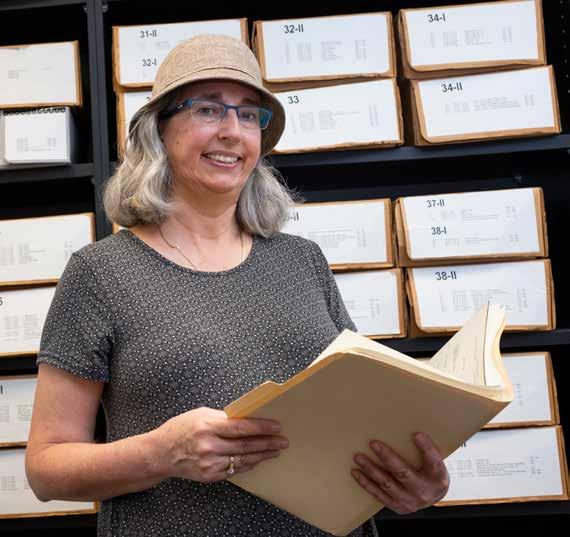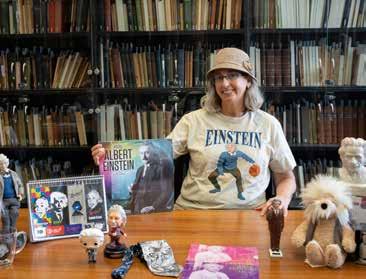5 minute read
AUSTFHU Year book 2022/2023
Next Article
Curiosity and Genius: Preserving Einstein’s Legacy
In Toronto, Chaya Becker had been a preschool teacher. She spent her days cultivating young minds, piquing children’s curiosity. But that did not prepare her for the twist her career took after making aliya in the early 1990s. Today she is the archivist for the Albert Einstein Archives, coordinating projects within the archives of the man who once famously said, “I have no special talents. I am only passionately curious.”
By Devora M. Liss
In the early aughts, Chaya came across a job board advertising the position of assistant to thencurator of the Albert Einstein Archives, Dr. Ze’ev Rosenkranz. Chaya applied on a whim and was accepted. After about a decade on the job, Chaya was ready to advance her career and become the archivist, to assume responsibility for the world’s largest collection of Einstein’s manuscripts, correspondences, papers, and books.
Chaya sought out opportunities for professional growth. Hebrew University had just closed its School of Library, Archive, and Information
Studies, so Chaya enrolled at Beit Berl College, where she earned a certificate in archival studies. When the position opened up, Chaya was the perfect fit.
Chaya’s work falls into three distinct categories.
First, she cares for the collection – handling precious documents and other archival material, ensuring preservation treatments by a professional paper conservator to maintain the aging papers, and nearly four thousand books that comprised Einstein’s personal library, which are also under the care of a book conservator. These volumes have traveled the globe – in the 1930s Einstein’s’ personal
library was shipped from Berlin to Princeton, where the collection grew until, in the 1980s, it was shipped in its entirety to Jerusalem. Along with her colleagues, Dr. Roni Grosz, Miriam Kutschinski, and Anna Rabin, Chaya handles requests submitted by researchers and scientists worldwide asking to view Einstein’s documents or manuscripts to advance their own work. The archive also hosts inperson visitors, including researchers, diplomats, heads of state, and other VIPs. In advance of each visit, Chaya and the archives team carefully select items from the collection to present, focusing on each visitor’s particular interests, culture, or history. On a few occasions, the archive even hosted Albert Einstein’s descendants! To mark the 140th anniversary of the great scientist’s birth, Hebrew University invited Karen Cortell Reisman, Albert Einstein’s relative, to speak at a celebratory event. “I was able to show her letters written by her grandmother,” Chaya recalls. “It was very touching.”
Second, Chaya coordinates requests to use Albert Einstein’s image on commercial products and in advertisements. Hebrew University holds the publicity rights on Einstein’s image, likeness, and his literary works. Requests truly run the gamut – ranging from insurance companies to computer software, teddy bears to t-shirts – and even dog food. “As the beneficiary of Einstein’s estate, Hebrew University must protect his image and reputation. While many companies wish to be associated with Einstein’s genius, it is my job to ensure that his image and likeness are used in an appropriate and respectable manner.”
Lastly, Chaya is part of the team involved in the creation of exhibitions about Einstein, his life, and his legacy. In 1922, Albert Einstein travelled to the Far East, and the European scientist and the people he met developed an immense liking and interest in each other. To mark the 100th anniversary of this trip, a number of Asian institutions organized
exhibitions, drawing upon the Einstein Archives at Hebrew University. “Lending original objects is complex,” Chaya warns. “We need to guarantee that the object will be safe and secure, and stored in the proper climate-controlled environment. Even small fluctuations to the temperature or humidity can cause immediate and long-term damage.” Back in Jerusalem, the archive is kept at 20 degrees Celsius and 45% humidity. Many items are stored in special acid-free polyester sleeves to protect them from ultraviolet light, and the storage lighting meets the strictest archival standards.
The next few years will be exciting ones for Chaya and the Einstein Archives. “February 2023 marks the 100th anniversary of Einstein’s one and only visit to the Land of Israel, where he delivered the first scientific lecture on Mount Scopus, before Hebrew University officially opened its doors,” Chaya remarks. “This anniversary is ours alone. With the cooperation of a number of other Hebrew University departments, I’m hoping to develop exciting programs to commemorate his visit, perhaps even following in his footsteps through the city.”
Another exciting development is the Einstein House, which is currently under development and will open its doors in the coming years. “The new facility will enable the Einstein Archives to do more outreach – host more groups, more visitors, hold more public programs. I’m excited to continue sharing Albert Einstein’s exceptional legacy with the Israeli public and researchers worldwide.”

Chaya Becker in the Einstein Archives
(Photo: Maxim Dinshtein)

This article originally appeared in the Hebrew University’s Scopus magazine, and is reprinted with permission from the Hebrew University.

